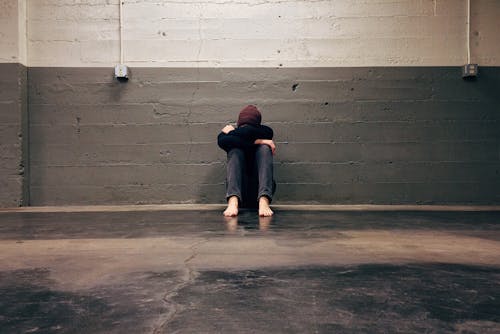
Depression is one of the most common mental illnesses with the most resources available for those suffering, but that doesn’t make the struggle of being depressed any less serious. Depression affects approximately 280 million people worldwide. It’s a mood disorder that alters your thoughts, feelings and behaviors. Depression is characterized by symptoms such as frequent low mood, low motivation, lack of desire to socialize, an inability to cope with the stressors of everyday life, and feelings of hopelessness.
Depression differs from simply ‘feeling blue’ in that it often persists for years, even with attempts to seek treatment. Significant emotional traumas such as the death of a loved one, giving birth or going through hardships can lead to depression, but sometimes there’s no particular cause for the onset. Depression is often diagnosed in conjunction with other psychiatric disorders such as anxiety or panic disorders. Frustratingly, major depressive disorder can occur for seemingly no reason at all. In these cases, it’s often a chemical imbalance of neurotransmitters or a structural difference of the brain that has resulted in depression.
“The dorsal and medial prefrontal cortex, the dorsal and ventral anterior cingulate cortex, and the orbitofrontal cortex of the insula are the areas of the cortical brain that are impacted by depression,” says Dr. Paul Poulakos, a psychiatrist at Greenwich Village Psychiatry in New York. “Additionally, decreased hippocampal volumes, decreased amygdala core volume often occurs in clinical depression, [as well as] increased activation of the amygdala. Furthermore, decreased serotonin is found in depression.”
Signs and Symptoms of Depression
The signs and symptoms of depression can impair your ability to do even the most basic tasks. This is why depressed individuals often have a messy apartment or poor personal hygiene. Simply getting out of bed and keeping a clean home often feels impossible in the throes of depression.
Sadly, even when depression is more manageable, people who live with it often report that it negatively impacts their professional and social lives, as well as their outlook on life. This means that even a high-functioning depressed person will still often deal with internal struggles that others aren’t aware of.

Some symptoms of depression include:
- Disturbed Sleep: Depression can change your sleep cycle. Some suffer from insomnia, while others sleep far too much.
- Loss of Interest in Hobbies You Once Enjoyed: Many who live with depression lose interest in the things that once brought them joy. This can include hobbies, exercise, and soclializing. They may show little to no interest in the lives of their loved ones.
- Low Energy: Depressed individuals often feel lethargic, lazy, unmotivated, low energy and fatigued.
- ‘Brain Fog’ or the Inability to Make Decisions: Structural changes to the brain regions responsible make it difficult for someone with depression to think clearly and make sound decisions as well as decreased problem-solving abilities.
- Changes in Appetite or Unexplained Weight Gain/Loss: It’s very common for people to engage in ‘emotional eating’, and depressed individuals with a feeling of emptiness often try to fill that emotional void with food.
- Sadness, Fear, Anger, or Emotional Reactivity: Dr. Poulakos explains, “Depressed individuals experience heightened negative emotions due to increased activity in the amygdala, making…intense emotions [such as fear, anger and sadness] felt at extreme levels,”
- Feeling Worthless, Guilty, or Hopeless.
- Thoughts of Self-Harm: Sometimes a depressed person will have what’s called ‘suicidal ideation’, thoughts of suicide, or thoughts of self-harm. This is why seeking medical attention is crucial if you start to have these thoughts.
- Physical Symptoms: Some physical symptoms of depression include body aches, headaches, acid reflux or other physical responses to stress.
Diagnosing Depression
For some people who have no history of depressive disorder, depression can occur once. In many others, depression occurs cyclically. Recurrent depressive disorder happens when a majorly depressive episode takes place 6 months or more after the previous one.
In order for an episode to be diagnosed as depressive disorder, symptoms need to be experienced for at least two weeks. Depending on the severity of the symptoms and how disruptive they are to one’s daily functioning, depression can be diagnosed as either mild, moderate, or severe.
Depression can happen to anyone, and there are many risk factors that contribute to depression, including the environment you live in or grew up in, your biochemistry, your personality/outlook on life, your experienced traumas, and even your genetics.
Medical professionals have long been aware that depression tends to run in families, but scientists studying depression in families isolated a specific gene that appears to play a part in the heritability of depressive disorder: chromosome 3p25-26. You can find out more about your genetic risk factors of developing depression by taking a DNA test from CircleDNA.
Can you ‘self-diagnosis’ depression? You or your loved ones might notice symptoms of depression leading to a self-diagnosis, or you can take an assessment test if you suspect that you are suffering from depressive disorder. It’s best to get a professional diagnosis of depression. Your family doctor can refer you to a Psychiatrist who can formally diagnose depression.
If you feel that you are depressed and you don’t feel you need a professional diagnosis to confirm this, it’s important to consider the benefits that come with a formal diagnosis. Being diagnosed with depression opens up doors to all the treatment options available. In addition, a diagnosis can give you back some of the peace of mind that depression takes from its victims.

Treatment Options for Depression
Fortunately, depression can be treated. There are actually many different forms of treatment available, and most people find relief of the symptoms of depression with a combination of treatment forms.
Counselling and Various Forms of Therapy:
Sometimes, unresolved trauma can contribute greatly to depression. Talk therapy, psychotherapy, and cognitive behavioural therapy can all effectively help you engage better with the world, with stress and, importantly, with yourself. Changing your personal narrative and learning how to challenge some of the intrusive thoughts that come with a depressed mindset can be an effective way of overcoming depressive disorder.
Medications:
SSRIs and TCAs are the two most common forms of antidepressant medications available. They work by increasing the amount of neurotransmitters in your brain, specifically serotonin and norepinephrine. Antidepressants are safe to take for most people, although it can sometimes take weeks or months to find the dosage that’s best for you.
Lifestyle Changes:
Simply getting more fresh air outside, more sunshine, more time with loved ones, more exercise, and more exposure to nature can help ease symptoms of depression. Consider joining a fun spin studio, or join a meet-up group for hikers.
What About Psychedelics? Psilocybin and Depression
John Hopkins University has been studying the effects of psilocybin, the active ingredient in magic mushrooms, for over 20 years now, and some of what they are finding out is both astonishing and hopeful.
Despite the fact that several types of depressive disorders are out there, Roland Griffiths, Ph.D and and director of the Johns Hopkins Center for Psychedelic and Consciousness Research explains, “Most of our study participants found the psilocybin treatment to be effective.” More than half of research participants reported a decrease in their symptoms 4 weeks following treatment.
Psilocybin shares some similarities with serotonin, the neurotransmitter that is most closely associated with depression. Among other things, serotonin plays a part in how we regulate our moods, and it’s thought that regular ingestion of small amounts of psilocybin (known as microdosing) can help restore your body’s optimal levels of serotonin.
Research in this area is still ongoing, but it is very promising. While antidepressants can be an effective form of treatment for many, there is usually a long trial-and-error process before an effective dose is found, and the effects are not always long lasting.
Do You Struggle with Depression?
It’s important to keep in mind that if you are battling depression, treatment is out there. Overcoming depression is a challenge, and there are many things you can do to help yourself along the way.
A healthy diet and exercise can help your body feel better even if your mind doesn’t. Resist the urge to sleep, watch TV, disassociate with video games or scroll through social media all day. Make a point to get out of bed everyday, even if it feels like a monumental task. Adherence to some kind of a routine can also help ease the severity and longevity of depressive episodes.
Reach out to family and friends and let them know that you need their support.
Most of all, remember that you are not defined by your depression. Your symptoms are a response to what your brain is doing, not a reflection of who you are. You are not a broken person, your brain is just wired a little differently. Many depressed people do get better, whether it’s from microdosing or going to therapy, and there is hope.







Comments are closed.